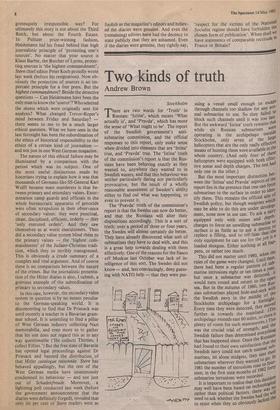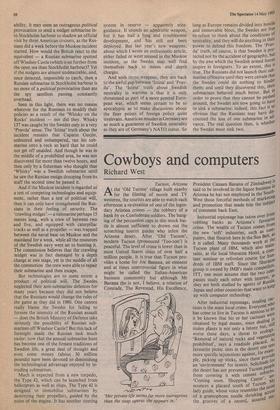Two kinds of truth
Andrew Brown
Stockholm
There are two words for 'Truth' in 1 Russian: 'Istina', which means 'What actually is', and 'Pravda', which has more the sense of 'What ought to be'. The report of the Swedish government's anti- submarine commission, and the official responses to this report, only make sense when divided into elements that are 'Istina' true, and 'Pravda' true. The 'Istina' truth of the commission's report is that the Rus- sians have been behaving exactly as they wanted to, anywhere they wanted to in Swedish waters; and that this behaviour was neither particularly daring nor particularly provocative, but the result of a wholly reasonable assessment of Sweden's ability either to find out what was happening, or even to prevent it.
The 'Pravda' truth of the commission's report is that the Swedes can now do better, and that the Russians will alter their dispositions accordingly. This is a sort of truth: over a period of three or four years, the Swedes will almost certainly do better. They have already discovered what sort of submarines they have to deal with, and this is a great help towards dealing with them effectively. One of the reasons for the fiasco off Muskoe last October was lack of in- telligence of this sort. The Swedes did not know — and, less convincingly, deny guess- ing with NATO help — that they were pur-
suing a vessel small enough to escape through channels too shallow for any not- mal submarine to use. So they failed to block such channels until it was too late. But the awkward Istina' truth remains that whilesix Russian submarines were operating in the archipelago outside Stockholm, only seven of the large helicopters that are the only really effective means of hunting them were available in the whole country. (And only four of the helicopters were equipped with both effec- tive sonar and depth charges. The rest had only one or the other.) But the most important distinction bet- ween the 'Istina' and Pravda' aspects of the report lies in the pretence that one can force submarines to the surface in order to iden- tify them. This remains the official aim Swedish policy, but though weapons whIell may be able to do this are under develoP- ment, none now in use can. To ask a navY equipped only with mines and depth" charges to force an unwilling submarine t° surface is as futile as to ask a dentist to replace a filling, and to tell ihimi that i.the only equipment he can use for the job Is a loaded shotgun. Either nothing at all hal"' pens, or rather too much. This did not matter until 1980, when the rules of the game were changed. Until the!a, there had been a regular pattern of sal' marine intrusions eight or ten times a 31,ear1 but once a submarine was detecteo, would turn round and return to the °Pe,_ sea. But in the autumn of 1980, two 1111,1 sian submarines played hide-and-seek With the Swedish navy in the middle of, t11, Stockholm archipelago for a fortnt Every time they were detected, they 111°,v„,se
further in towards the mainland. 0,
5 archipelago extends east 60 miles, so there !. plenty of room for such manoeuvres.) Tilt; was the crucial trial of strength, and Swedish failure then determined everytr: that has happened since. Once the LIR small: had found to their own satisfaction that .t,b_ Swedish navy could not catch normal marines, let alone midgets, they sent thc,,r; submarines wherever they wanted to
1981 the number of intrusions rose to four- teen; in the first nine months of 1982 faro submarine intrusions were recorded. ,o_
It is important to realise that this decis.ical may well have been based on technologl„,0 rather than political factors. there was need to ask whether the Swedes had the' to resist when they so obviously lacked the ability. It may seem an outrageous political provocation to send a midget submarine in-
to Stockholm harbour to shadow an official visit by three American cruisers, as the Rus- sians did a week before the Muskoe incident started. How would the British react to the equivalent — a Russian submarine spotted off Windsor Castle (which is no further from the open sea than Stockholm harbour)? Yet if the midgets are almost undetectable, and, once detected, impossible to catch, then a
Russian submarine in Stockholm harbour is no more of a political provocation than are the spy satellites passing constantly overhead.
Seen in this light, there was no reason whatever for the Russians to modify their policies as a result of the 'Whisky on the Rocks' incident — nor did they. Whisky 137 was caught by the Swedes only in a very 'Pravda' sense. The 'Istina' truth about the incident remains that Capatin Gusjin, unhunted and unhampered, ran his sub- marine onto a rock so hard that he could not get off unaided. And though he was in the middle of a prohibited area, he was not discovered for more than twelve hours, and then only by a fisherman who thought that 'Whisky' was a Swedish submarine until he saw the Russian ensign drooping from its staff the second time he passed it.
And if the Muskoe incident is regarded as a test of competing technologies and equip- ment, rather than a test of political will, then it can only have strengthened the Rus- sians in their feeling of security. The 'crawling midget' — a submarine perhaps 15 metres long, with a crew of between two and five, and equipped with caterpillar tracks as well as a propeller — was trapped between the naval base on Muskoe and the mainland for a week, while all the resources of the Swedish navy were set to hunting it.
The commission believes that the crawling midget was in fact damaged by a depth charge at one stage, yet in the middle of all the commotion the crew were able to repair their submarine and then escape.
But technologies are to some extent a product of political will. The Swedes neglected their anti-submarine defences for many years because they did not believe that the Russians would change the rules of the game as they did in 1980. One cannot really blame the Swedes for failing to foresee the intensity of the Russian assault — does the British Ministry of Defence take seriously the possibility of Russian sub- marines off Windsor Castle? But this lack of foresight made the Russian task much easier: now that the annual submarine hunt has become one of the firmest traditions of Swedish life, a great deal of thought and even some money (about 30 million pounds) have been devoted to diminishing the technological advantage enjoyed by in- truding submarines.
Much is expected from a new torpedo, the Type 42, which can be launched from helicopters as well as ships. The Type 42 is designed to immobilise submarines by destroying their propellers, guided by the noise of the engine. It has another steering system in reserve — apparently wire- guidance. It sounds an admirable weapon, but it has had a long and troublesome development, and has still not been deployed. But last year's new weapons, about which I wrote an enthusiastic article, either failed or went unused in the Muskoe incident, so the Swedes may well find themselves back to mines and depth charges.
And with those weapons, they are back to the awful gap between `Istina' and 'Prav- da'. The 'Istina' truth about Swedish neutrality in wartime is that it is only threatened as part of a more general Euro- pean war, which seems certain to be so apocalyptic as to make discussions about the finer points of foreign policy quite irrelevant. American missiles in Germany are as much a guarantee of Swedish neutrality as they are of Germany's NATO status. So
long as Europe remains divided into hostile and immovable blocs, the Swedes are free to refuse to think about the conditions of neutrality, and they will do anything in their power to defend this freedom. The 'Prav- da' truth, of course, is that Sweden is pro- tected not by the accident of geography, but by the awe which the Swedish armed for inspire in foreigners. To an extent, this is true. The Russians did not launch their sub- marine offensive until they were certain that the Swedes could do nothing to hinder them; and until they discovered this, their submarines behaved much better. But in order to prove that they cannot be Pushed around, the Swedes are now going to have to sink a submarine: indeed, this fact is so obvious that the Russians may have dis- counted the loss of one submarine in ad- vance. The real question then, is whether the Swedes must sink two.
IWO











































 Previous page
Previous page